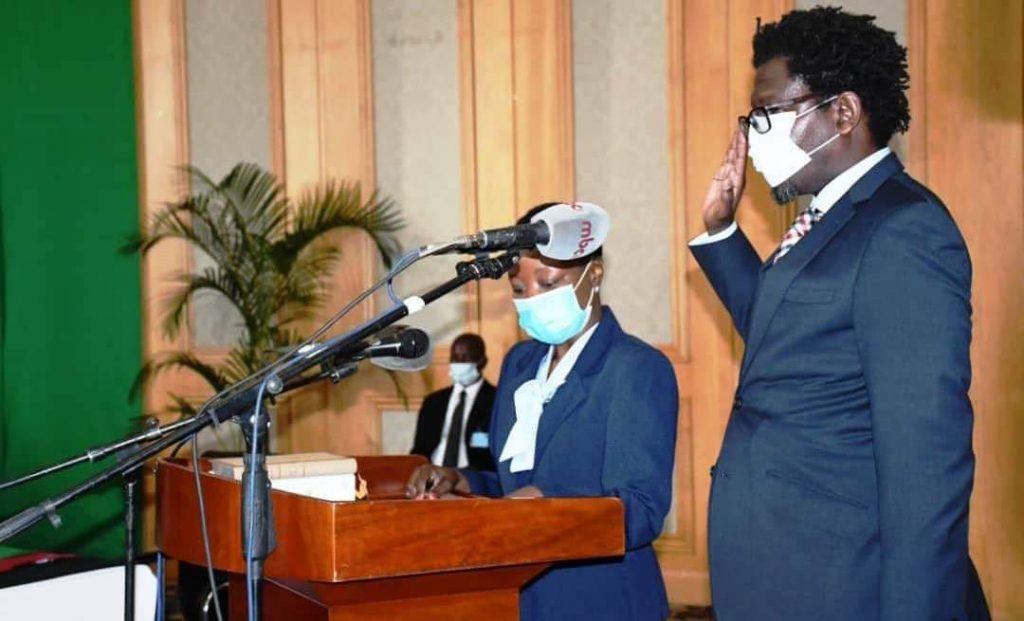Chakwera fires Attorney General
President Lazarus Chakwera on Wednesday dismissed Attorney General (AG) Chikosa Silungwe a year after his appointment, raising questions and speculation about the decision and the potential legal and political implications.
In an interview on Wednesday, Solicitor General and Ministry of Justice Principal Secretary Reyneck Matemba confirmed the exit of the country’s 18th AG in 57 years.

“I can confirm that the Ministry of Justice has formally been notified and the AG has also bid goodbye to officers,” he said.
Reasons for the decision were not immediately available, but under Section 98 of the Constitution the AG is designated five years in office unless the office-bearer resigns or retires or until the end of a President’s term whichever comes first.
On the other hand, the President can under the same law, remove the AG for either incompetence, incapacity or impartiality (compromise in the discharge of duties).
Ministry of Justice sources confided on Wednesday that the dreadlocked Silungwe, who was appointed AG after being lead counsel for Vice-President Saulos Chilima in the May 21 2019 presidential election petition, bid farewell to his colleagues at the ministry headquarters after receiving the marching orders in a letter from Office of the President and Cabinet delivered on Tuesday.
Secretary to the President and Cabinet Zanga-Zanga Chikhosi was not available for comment while presidential press secretary Brian Banda referred questions on the matter to Chikhosi.
Silungwe himself was also not available for comment.
In an interview on Wednesday, Malawi Law Society (MLS) president Patrick Mpaka said until the reasons for the AG’s removal are known, it will be difficult to speculate whether there are legal ramifications for the decision.
He said: “The law states that the AG will be in office for five years unless he or she resigns or retires or until the end of a President’s term whichever of the three aspects happens first. The AG can also be removed from office by the President on any of the following three reasons: incompetence or incapacity or impartiality.”
In a separate interview on Wednesday, University of Malawi political analyst Ernest Thindwa said the dismissal of the AG reflected a breakdown of relationship between the office of the AG and that of the President.
He dismissed suggestions that the dismissal of Silungwe, a perceived key lieutenant to the Vice-President, signalled a major rift between the two Tonse Alliance major partners, Malawi Congress Party (MCP) and UTM Party.
Said Thindwa: “I don’t think it is about Tonse infighting. UTM and MCP infighting doesn’t happen at higher level. It is often at the grass roots. “The firing is more to do with disagreements between the office of President and the AG. Most of the advice [from the AG] was not taken on board. It shows lack of confidence in the AG, not necessary lack of capacity.
“It might not be a different agenda, but lack of understanding between the AG and the President. The operational mode of the AG might not have pleased the President.”
During his tenure, Silungwe provided several legal opinions that were not popular with the President if sentiments by his lieutenants were anything to go by.
The perceived controversial legal opinions included his advised to the OPC to issue appointment letters for two Malawi Electoral Commission (MEC) members Jean Mathanga and Linda Kunje. The President instead proceeded to fire the two on the basis that both the High Court sitting as the Constitutional Court and the Malawi Supreme Court of Appeal in the presidential elections case had questioned their competences.
However, the court reinstated the duo before a court action by MCP secretary general Eisenhower Mkaka led to the dismissal of the two alongside Arthur Nanthuru and Steve Duwa for purportedly not having been duly appointed. The court faulted former president Peter Mutharika for abusing his power to appoint more commissioners affiliated to his Democratic Progressive Party (DPP).
The DPP has since asked the Constitutional Court to interpret the law and see whether the fact that the four—who were part of the team that managed the court-sanctioned presidential election that ushered Chakwera into office—had been dismissed did not nullify the elections they presided over.
Thindwa also dismissed assertions that leakages of legal opinions from the AG’s office may have affected confidence levels in the office-bearer, saying leakages of official documents were not limited to the AG’s office.
He said: “It has become a culture to leak confidential documents in government. It is people within the civil service who leak documents. The AG could not have stooped so low.”
During the hearing of the presidential election case, the AG was a popular figure with his commanding voice and distinct looks among many youths whose political awareness was shaped by political events of the past few years.
At his swearing-in, Silungwe attracted attention when he opted for affirmation instead of swearing to a Bible as majority of Cabinet members did.





